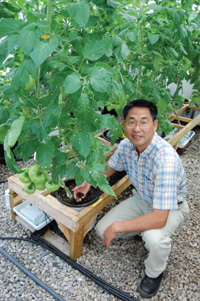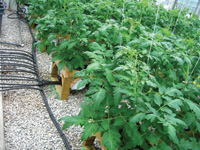
Greenhouse organic vegetable producers will soon have another soil
amendment to consider, and they’ll have “red wigglers” to thank for it. The University of Guelph has granted Forterra Environmental Corp. an
exclusive licence to market certain soil blends scientifically developed
at the southwestern Ontario university.
Greenhouse organic vegetable producers will soon have another soil amendment to consider, and they’ll have “red wigglers” to thank for it.
The University of Guelph has granted Forterra Environmental Corp. an exclusive licence to market certain soil blends scientifically developed at the southwestern Ontario university.
 |
|
| Dr. Youbin Zheng, University of Guelph, led work on high-end organic soil blends. PHOTO BY ANDRA ZOMMERS |
COMPANY WILL PAY SALES ROYALTY TO U OF GUELPH
Forterra is an Ontario-based manufacturer, marketer and seller of premium organic soil-enrichment products utilizing worm castings. It has been a contributor to the development of these new blends that are the result of a three-year research and development project. Under the five-year licence, which has a rollover provision for renewals, Forterra will pay a sales royalty to the university.
“The development of these high-end soil blends is great news, particularly for greenhouse organic vegetable growers as well as for home gardeners who can use these blends to improve their growing success for vegetables and other plants,” said Dr. Youbin Zheng, a researcher and adjunct professor at the School of Environmental Sciences.
“In particular, the development of these new soil blends meets the needs of greenhouse growers who are challenged to obtain consistently high-quality organic growing substrates.”
The researchers mixed and tested 35 organic growing substrates. Two of the growing substrates produced higher marketable beefsteak tomatoes than the other organic growing substrates and rockwool. Both of the leading substrates used Forterra worm castings.
VERMICASTINGS CONTAIN BENEFICIAL MICROBES
“Such vermicastings,” said Zheng, “are proven to contain beneficial microbes that can suppress some plant pathogens and therefore reduce the need for pesticide application.”
Organic food is increasing in popularity in many countries, especially in the developed world in recent years, said Zheng. Over the past two decades, the Canadian market for organic food has doubled every four years, and this trend is expected to continue. “Coinciding with this trend, consumers are increasingly conscious about the environment and prefer to ‘eat local and eat fresh’ for health and environmental benefits,” said Zheng. “Greenhouse production is the only way to provide freshly produced organic vegetables in Canada during winter months.”
Forterra plans to sub-licence its agreement with the U of G to a third party that has significant penetration into the greenhouse and nursery sectors. The company has received inquiries from various potential partners who are well entrenched in these sectors and who are well suited to manufacture the scientific recipe for sales into the market.
FURTHER STUDIES POSSIBLE WITH WORM CASTINGS
The development of the new soil blends is the most recent result of the excellent relationship Forterra has had for several years with the University of Guelph. It has provided funding for research, testing, and validation projects, and currently is discussing future projects that would involve further scientific investigation into soil mixes and other solutions using the company’s worm castings as the base or as a carrier.
 |
|
| An organic tomato trial
|
Forterra manufactures, markets, and sells environmentally friendly soil enhancers, using worm castings that boost fertility while restoring the soil with organic matter for sustainable, longer-term benefits, including stronger root growth, and drought and pest resistance.
The products contain only organic material, and are ideal for golf courses, sports fields, lawn care, parks, nurseries, orchards and vineyards. Essentially, Forterra uses red wiggler worms to convert organic material into vermicompost or worm castings. Worm castings contain micronutrients, which are required for healthy plant development. Worm castings also contain microbes, which increase the rate at which plants take up available macronutrients and micronutrients. ■
Print this page